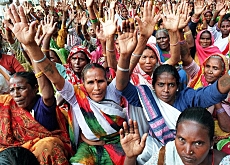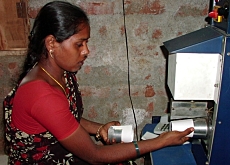Indian NGOs uncertain how to reach the poor

The poor need credit – this is one maxim, which the Indian partners of the Swiss Agency for Development and Cooperation agree on.
However, swissinfo’s Faryal Mirza found there is dissent among the ranks about how credit should be delivered to those who need it.
Rebecca Katticaren is a programme officer with the Swiss non-governmental organisation, Intercooperation, which supervises a number of the SDC’s partners in India.
She was sceptical that Basix, the for-profit microfinance institution, is actually reaching out to the poorest of the poor (see related article).
Basix’s mission is to encourage livelihood promotion among the rural poor, while demonstrating that providing financial services, such as microcredit, to low-income clients can be profitable.
“We wanted to know how these people were repaying the credit because we had anecdotal evidence that they would sell their possessions or do wage work to make repayments,” Katticaren told swissinfo.
Efforts to work more closely with Basix came to nothing, she said. “We did try; we realise that access to credit is important but Basix is not interested [in working with us],” she said.
Basix’s go-it-alone approach was a worrying development for a number of other local NGOs under the SDC and Intercooperation umbrella, whom I met in Hyderabad.
Their argument was that doing things in isolation did not necessarily foster development because an organisation like Basix lacked an overview of the situation on the ground.
Echoing this was Siva Prasad of Action for Food Production, an Indian NGO trying to reduce poverty.
“If [these new businesses are] not eco-friendly, then they are doing more harm than good,” Prasad stressed.
Katticaren said that the lack of collaboration between NGOs could lead to frustrating situations.
She referred to the popularity of goat-rearing in the state of Andhra Pradesh, of which Hyderabad is the capital and how her organisation is trying to educate farmers that too many grazing goats could be harmful to the environment.
And then the local goat population increases because an organisation like Basix gives loans to individuals to buy more goats, she added.
Other side
The SDC’s mission in New Delhi is fully aware that the different players on the developmental field in India do not often come together.
Its deputy director, Adrian Marti, told swissinfo that the SDC’s role in India was more of a facilitator. Funds and resources were not an issue in India, he said.
“The real problem is getting people to sit down together at the same table. It’s often not done and it’s difficult to bring actors together,” he said (see related story).
For its part, Basix admits that the work it is carrying out in the field of livelihood promotion cannot cure all social ills.
However they are firm in their belief that economic participation is an important development tool.
Basix also realises that it is spreading itself too thinly, so it’s trying to change track. It has plans to move away from lending to individuals and to work instead with groups.
It sees that microcredit cannot work in isolation and, while necessary, is not sufficient to combat poverty.
On its website it explains that “technical assistance and support” is what is needed to help and promote livelihoods in rural areas.
Manager Sankar Datta goes even further: he told swissinfo that the poor were not entrepreneurial by nature.
“The poor man does not want to become an entrepreneur – we the planers have thrust this upon them and they are not ready for it.”
This was why it was necessary to work not with the poor “but with the not-so-poor as this can generate a steady wage-supply”, Datta explained.
Opening up access
That Basix is innovative within microfinance in India and has opened up access to financial services to poor people is plain to see.
Its borrowers can take out a life or health insurance policy. It also has a “bank on wheels”, which visits people in remote villages, taking banking services to them.
But to what extent are the likes of Basix actually contributing to social change in India? On one level, women have certainly been empowered.
As one lady, Ramadevi, told swissinfo, she no longer has to ask her husband for money. She set up a business producing metal souvenirs, which are sold at Bhadrachalam, a local pilgrimage centre.
Another woman, Balamma, who runs a stall selling sandals with her shoemaking husband, told me that it was her idea to open the stall using a loan from Basix.
However, many of the microentrepreneurs I met in Andhra Pradesh had aspirations to expand their businesses, but none mentioned ploughing their profits into the expansion. Instead they all wanted more credit.
A sizeable chunk of the microentrepreneurs were members of occupational castes within the Hindu religion. This meant that the trades they were carrying out were ones handed down to them by their ancestors.
I asked Datta to what extent his organisation was helping to smash the caste system’s penetration in Indian society – whether someone from a basket-weaving caste could approach Basix for help to become a pottery-maker.
“We consciously do not encourage new enterprises but it does happen. If someone with a cycle shop wanted to set up a tea stall side-by-side, then we would finance [this extension],” Datta said.
Katticaren had a response to the question whether the likes of Basix were promoting social change through microfinance.
“If you see empowerment as a ladder, then microfinance becomes a block at a certain level,” she said.
swissinfo, Faryal Mirza in Hyderabad, India
Microfinance refers to loans, savings, insurance, transfer services and other financial products for low-income clients.
Microcredit is a small amount of money loaned to a client by an institution often without collateral.
There are some 500 million borrowers worldwide.
Microenterprises make up 80% of all businesses in developing nations.

In compliance with the JTI standards
More: SWI swissinfo.ch certified by the Journalism Trust Initiative


You can find an overview of ongoing debates with our journalists here. Please join us!
If you want to start a conversation about a topic raised in this article or want to report factual errors, email us at english@swissinfo.ch.